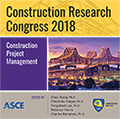Chapter
Mar 29, 2018
Time-Environmental Impacts Tradeoff Analysis for Businesses Commuters
Authors: Shahryar Monghasemi [email protected], Moatassem Abdallah [email protected], Aly Tawfik [email protected], and Caroline Clevenger [email protected]Author Affiliations
Publication: Construction Research Congress 2018
Abstract
In 2015, the transportation sector accounted for 27% of the total greenhouse gas (GHG) emissions in the United States; only second to the electricity sector with 29% share. Half of the emissions from the transportation sector are produced from passenger cars and light-duty trucks. Substantial proportions of the transportation emissions come from drive-alone commute mode, which is reported in 2013 as the predominant commute mode with 76.4% of the total traveled miles in USA. This highlights the importance of identifying solutions that would reduce the drive-alone mode to decrease the transportation related emissions. Furthermore, employers often provide free parking spaces to their employees and accordingly existing business commute choices rely mainly on employees’ preferences, intermediate stops and time constraints. Accordingly, optimized solutions that provide individualized commute plans and comply with commuter needs are required to improve efficiency of the transportation system. This paper presents the development and implementation of a novel and innovative optimization system that is capable of identifying optimal tradeoffs among two important transportation objectives: minimizing negative environmental impacts and commute times. This system identifies the optimal commute mode for each commuter, such as drive existing vehicle, carpool, use public transit, bike, or walk to achieve the aforementioned objectives. The present system is designed to: (1) maintain convenience such as departure and arrival times, and commute duration; and (2) incentivize commuters such as providing monetary incentives, and realizing burned calories, health benefits, and saved commute time and cost due to changes in commute behavior. A case study of students at University of Colorado Denver is used to verify the system performance and demonstrate its use. The results of the case study show that GHG and air pollution emissions can be minimized in the student community by up to 26%, while minimizing total commute time and cost of students.
Get full access to this article
View all available purchase options and get full access to this chapter.
Information & Authors
Information
Published In
Copyright
© 2018 American Society of Civil Engineers.
History
Published online: Mar 29, 2018
Permissions
Request permissions for this article.
Authors
Affiliations
Construction Engineering and Management, Dept. of Civil Engineering, Univ. of Colorado Denver, 1200 Larimer, Denver, CO 80204. E-mail: [email protected]
Construction Engineering and Management, Dept. of Civil Engineering, Univ. of Colorado Denver, 1200 Larimer, Denver, CO 80204. E-mail: [email protected]
Dept. of Civil and Geomatics Engineering, California State Univ., Fresno, Fresno, CA 93740. E-mail: [email protected]
Construction Engineering and Management, Dept. of Civil Engineering, Univ. of Colorado Denver, 1200 Larimer, Denver, CO 80204. E-mail: [email protected]
Metrics & Citations
Metrics
Citations
Download citation
If you have the appropriate software installed, you can download article citation data to the citation manager of your choice. Simply select your manager software from the list below and click Download.
View Options
Get Access
Access content
Please select your options to get access
Log in/Register
Log in via your institution (Shibboleth)
ASCE Members:
Please log in to see member pricing
Purchase
Save for later Item saved, go to cart Information on ASCE Library Cards
ASCE Library Cards let you download journal articles, proceedings papers, and available book chapters across the entire ASCE Library platform. ASCE Library Cards remain active for 24 months or until all downloads are used. Note: This content will be debited as one download at time of checkout.
Terms of Use: ASCE Library Cards are for individual, personal use only. Reselling, republishing, or forwarding the materials to libraries or reading rooms is prohibited.
Terms of Use: ASCE Library Cards are for individual, personal use only. Reselling, republishing, or forwarding the materials to libraries or reading rooms is prohibited.
Get Access
Access content
Please select your options to get access
Log in/Register
Log in via your institution (Shibboleth)
ASCE Members:
Please log in to see member pricing
Purchase
Save for later Item saved, go to cart Information on ASCE Library Cards
ASCE Library Cards let you download journal articles, proceedings papers, and available book chapters across the entire ASCE Library platform. ASCE Library Cards remain active for 24 months or until all downloads are used. Note: This content will be debited as one download at time of checkout.
Terms of Use: ASCE Library Cards are for individual, personal use only. Reselling, republishing, or forwarding the materials to libraries or reading rooms is prohibited.
Terms of Use: ASCE Library Cards are for individual, personal use only. Reselling, republishing, or forwarding the materials to libraries or reading rooms is prohibited.
